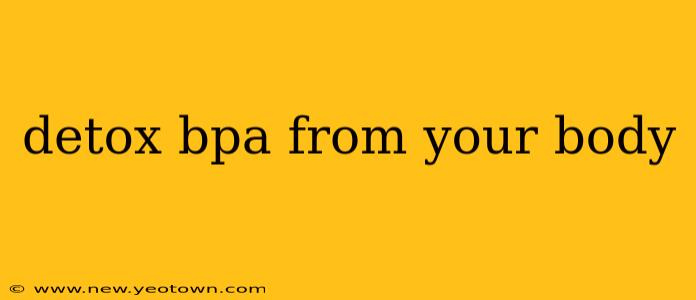Detoxing BPA: A Journey to a Healthier You
Bisphenol A (BPA), a chemical found in many plastics and resins, has become a household name, albeit often for concerning reasons. Many worry about its potential health effects, and the question on everyone's mind is: how do I detox BPA from my body? The truth is, there's no single magic bullet, but a multi-pronged approach can significantly reduce your BPA exposure and support your body's natural detoxification processes. This isn't a quick fix; it's a lifestyle shift towards a healthier you.
Let's begin our journey by understanding the challenges and then outlining effective strategies.
What is BPA and Why Should I Worry About It?
BPA is an endocrine disruptor, meaning it interferes with the body's hormonal system. This disruption can potentially lead to a range of health issues, from developmental problems in children to reproductive issues and even an increased risk of certain cancers. While research continues to evolve, the precautionary principle suggests minimizing exposure whenever possible.
How Does BPA Enter My Body?
The primary way BPA enters our bodies is through contact with food and drink containers made with polycarbonate plastics or epoxy resins. Think canned foods, plastic water bottles, and even the lining of some food cans. Heat can accelerate BPA leaching, making hot beverages in plastic containers particularly risky. Dust and air can also contain small amounts of BPA.
How Long Does It Take to Detox BPA from My Body?
This is a question many people ask, and unfortunately, there isn't a definitive answer. BPA's half-life in the body is relatively short, meaning half of it is eliminated within a few days. However, constant exposure means it's a continuous cycle. The focus should be on minimizing new exposure and supporting your body's elimination mechanisms.
What Foods Can Help Detox BPA?
Several foods can support the body's natural detoxification processes and help to eliminate toxins, including BPA. Focus on a diet rich in:
- Cruciferous Vegetables: Broccoli, cauliflower, kale, and Brussels sprouts contain compounds that aid liver detoxification.
- Fiber-Rich Foods: These promote regular bowel movements, which is crucial for eliminating toxins.
- Antioxidant-Rich Foods: Berries, dark leafy greens, and nuts help protect cells from damage caused by free radicals, a byproduct of the body's detoxification process.
These foods won't directly remove BPA, but they fortify your body's systems.
What are the Best Ways to Reduce My BPA Exposure?
Here’s where the real work begins. Let's explore practical steps to reduce your BPA exposure:
- Choose BPA-Free Products: Look for products labeled "BPA-free." However, it's worth noting that "BPA-free" doesn't automatically mean completely safe; some alternatives may have their own potential concerns.
- Avoid Microwaving Plastics: Heating plastic containers, especially older ones, can increase BPA leaching. Opt for glass or ceramic alternatives.
- Wash Reusable Containers Properly: Thoroughly wash reusable containers, especially those containing acidic foods like tomato sauces.
- Choose Glass or Stainless Steel Containers: These are safer alternatives for storing food and beverages.
- Wash your hands frequently: This can minimize the ingestion of BPA through skin contact.
- Eat a balanced diet: A well-balanced diet provides the nutrients necessary for your body to function optimally and process toxins.
Does Drinking More Water Help Detox BPA?
Increased water intake is beneficial for overall health, supporting various bodily functions, including detoxification. While it won't directly target BPA, it helps flush out toxins generally.
Are There Supplements that Can Help Detox BPA?
While some supplements are marketed as BPA detoxifiers, there's limited scientific evidence to support their effectiveness. Focus on lifestyle changes and a healthy diet rather than relying solely on supplements.
The Ongoing Journey
Detoxing BPA isn't a one-time event but a continuous effort. By making conscious choices about the products we use and the food we eat, we significantly reduce our exposure and support our bodies’ natural detoxification systems. Remember, a healthy lifestyle is the best defense. This journey is about making sustainable changes that benefit your overall well-being, not just addressing BPA alone.

